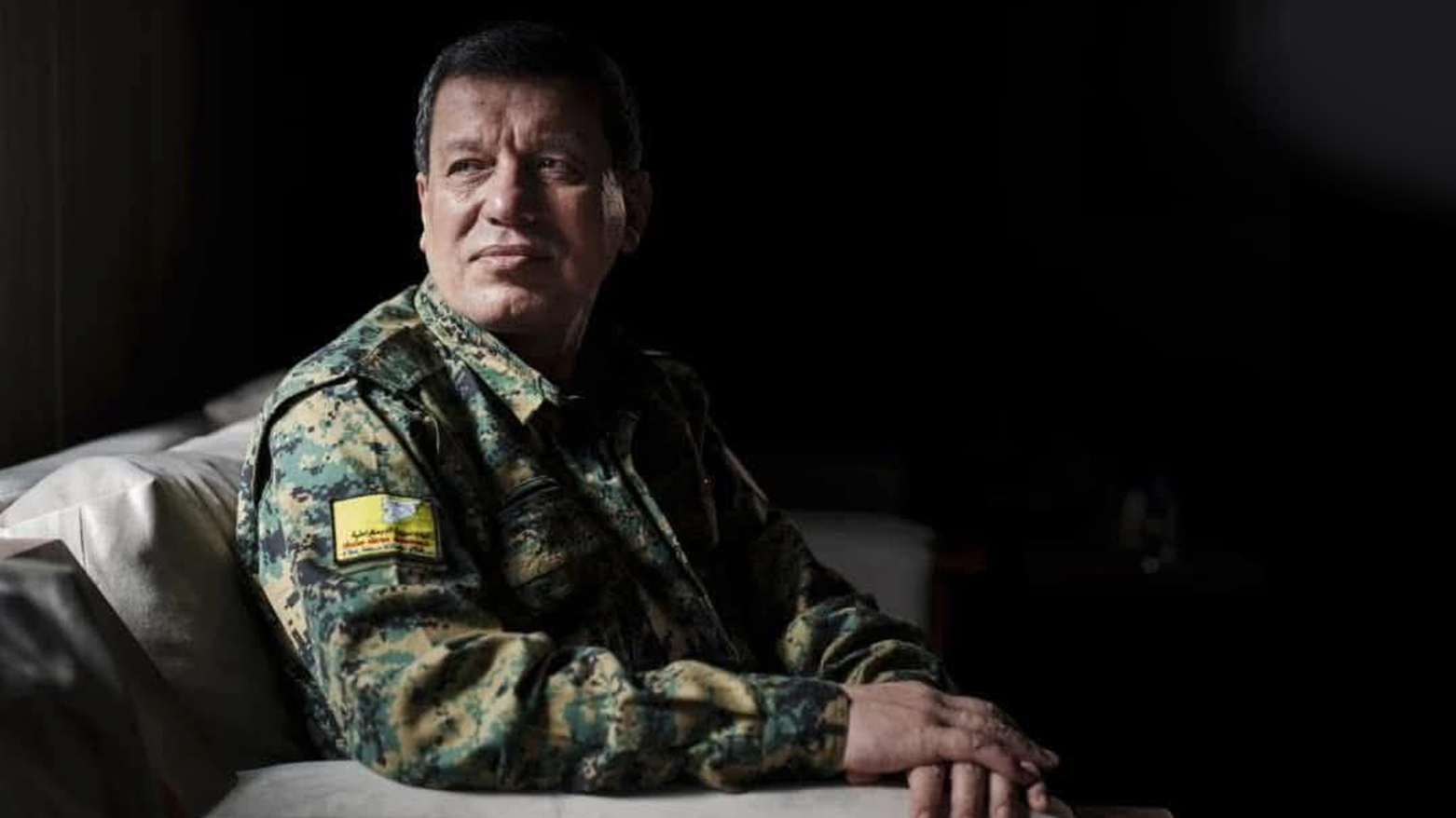Mazloum Abdi Breaks Silence: Talks with Damascus, Ceasefire with Turkey, and the Shape of a New Syria
SDF's Abdi reveals ceasefire with Turkey, seeks decentralized Syria inspired by Kurdistan Region's model. Confirms 10,000 ISIS detainees, denies Israel ties. Calls for inclusive governance, warns of civil war risks if unity fails.

By Ahora Qadi
ERBIL (Kurdistan24) – In an interview with Shams TV, Syrian Democratic Forces (SDF) Commander General Mazloum Abdi revealed behind-the-scenes negotiations with Damascus, a conditional ceasefire with Turkey, and a strong commitment to building a decentralized, democratic Syria — inspired by the Kurdish model in the Kurdistan Region of Iraq.
Abdi addressed a number of pressing topics, ranging from the future of federalism, the role of minorities, and post-war reconstruction to Turkey, U.S. relations, and the fate of ISIS prisoners.
On Turkey: A Conditional Ceasefire and a Hope for Normalization
In one of the most revealing sections, General Abdi confirmed the existence of a conditional ceasefire with Turkey, now in effect for more than two months.
“We’re not at war with Turkey today,” he said. “We have a temporary, conditional truce, and we hope it becomes permanent.”
The commander added that direct and indirect communication channels with Ankara are open, but noted that Turkey continues to insist on the integration of the SDF into the Syrian army and resolution of frontline tensions.
Asked about rumors of a possible meeting with Turkish President Recep Tayyip Erdoğan, Abdi responded: “There are no plans at the moment, but I have no objection. The future is open.”
He also welcomed the decision by the Kurdistan Workers' Party (PKK) to dissolve itself, saying it had a “positive effect” and likely contributed to the ceasefire.
Syria’s Future: Decentralized, Inclusive, but United
Turning to Syria’s political trajectory following the fall of Bashar al-Assad, Abdi emphasized the need for a decentralized system where local populations manage their own political, security, and administrative affairs.
“What we want is self-administration,” he said. “We are not asking for secession. We are committed to Syrian unity and sovereignty.”
Despite accusations that Kurds seek to divide Syria, Abdi reiterated that the political document approved at the Kurdish Unity Conference in Qamishli does not contradict the March 10 Agreement signed with the new Syrian President Ahmad al-Shar’a.
“The president’s reaction was hasty,” Abdi noted. “We are united as Kurds and will form a unified delegation to negotiate in Damascus.”
Learning from Erbil: The Kurdistan Region as a Model of Coexistence
Reflecting on his recent visit to Erbil and meeting with President Masoud Barzani, Abdi described the Kurdistan Region as a “successful model” of coexistence, stability, and governance.
“We can replicate this success in Rojava and across Syria,” he said, noting the peaceful relations among Kurds, Arabs, Christians, and other communities in northern Iraq.
Integrating Forces, Demilitarization, and A Return to Civilian Life
Asked when Kurdish fighters would lay down their arms, Abdi stated:
“The only condition under which we will fight again is if we are attacked. Otherwise, we are ready to integrate into a unified Syrian military — but only through coordinated dialogue.”
He confirmed that military committees have been formed to discuss the integration of SDF forces into the Syrian army and stressed the importance of maintaining the rights of SDF officers and soldiers.
“Our fighters will have a future in Syria’s military and civil institutions,” he said. “They’ve earned it.”
On the fate of female fighters, he affirmed that units like the Women’s Protection Units (YPJ) should form part of the country’s new security and defense structure.
Minorities, Israel, and the Risk of Civil War
Addressing intercommunal relations, Abdi emphasized that Kurds maintain strong ties with Christians, Alawites, and Druze communities.
“After what happened in the coastal and Druze areas, their fears are justified,” he said. “But we reject sectarianism. Alawites must be offered real guarantees.”
On accusations of Kurdish ties with Israel, Abdi firmly stated:
“We have no relationship with Israel. Any such claim is false.”
He acknowledged that Syria is still vulnerable to civil war, citing the ongoing security vacuum and warning that “any delay in building inclusive institutions increases that risk.”
ISIS, Oil Revenues, and the U.S. Presence
Abdi confirmed that nearly 10,000 ISIS detainees remain under SDF custody. Joint committees with Damascus will soon be formed to discuss the fate of these prisoners.
“Foreign fighters must be returned to their countries. Syrian fighters should be tried inside Syria,” he said.
As for oil, Abdi was unequivocal:
“The resources in northeastern Syria belong to all Syrians. We want a fair distribution and will negotiate with Damascus on how these resources are managed.”
On relations with the United States, Abdi said they remain strong:
“U.S. forces are still here. They are also mediating in our talks with Damascus. And yes — the threat from ISIS is real and growing.”
On Ahmed al-Sharaa and the New Syrian Leadership
Addressing skepticism about the Syrian interim president Ahmed al-Sharaa, Abdi said he remains cautiously optimistic.
“We judge by actions, not words. My meetings with him were positive. If we work together, we can rebuild Syria.”
Asked whether President Ahmad al-Sharaa controls all of Syria, Abdi admitted there is still a security vacuum, but said unity between Damascus and SDF is key to rebuilding the nation.
Final Word: “Our Fight is Defensive, Not Vengeful”
In conclusion, General Mazloum Abdi rejected all notions of Kurdish revenge.
“We do not believe in sectarianism or vengeance. The SDF is a multiethnic force. We fought for dignity — not for revenge.”
In concluding the interview, when asked who the enemy of the Kurdish people was, he avoided naming a specific government or actor. Instead, he defined the enemy as a 'racist, sectarian, and ignorant mentality.